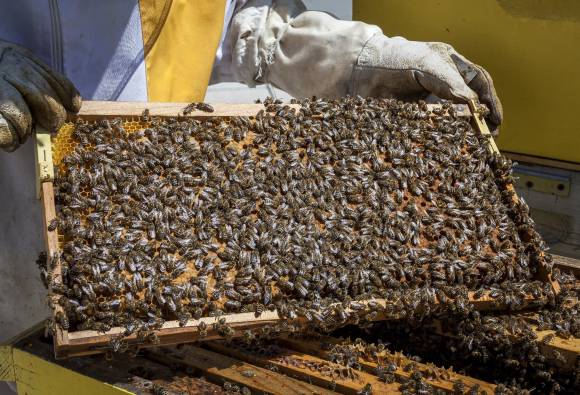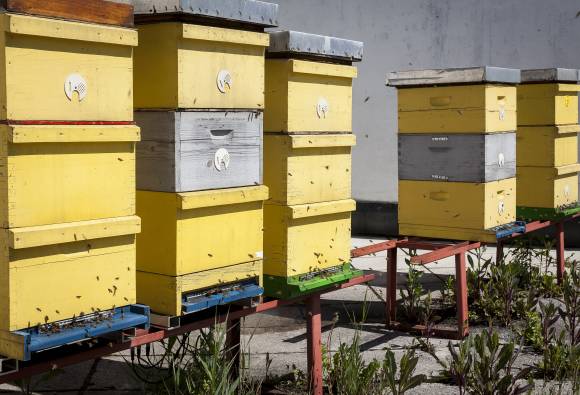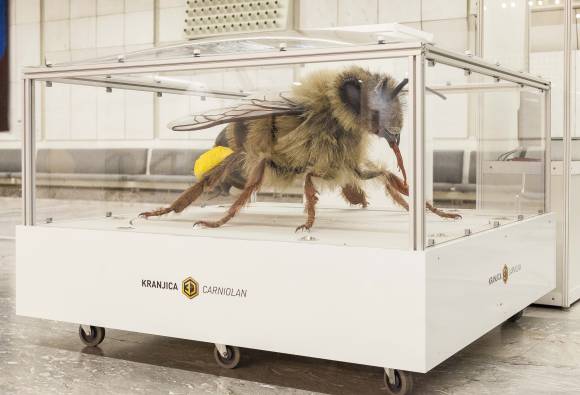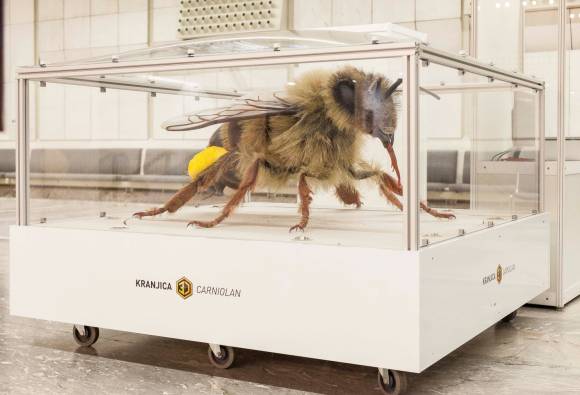
World Bee Day
Giant Honeybee and Bees on Cankarjev dom’s Roof
Celebrating the World Bee Day and the 11th anniversary of urban beekeeping at Cankarjev dom
As a pioneer of urban beekeeping in Slovenia, Cankarjev dom joins in the celebrations of the 5th World Bee Day (20 May), whose main purpose is to raise awareness of the importance of bees and other pollinators for humanity, food security, elimination of global hunger, environmental protection and biodiversity. Bees are pollinators of most plants and an important link to the natural balance and existence of life on Earth. At the same time, World Bee Day is an opportunity to transfer our rich knowledge and the beekeeping technology, and to consolidate Slovenia's reputation as a green, healthy, proactive and innovative country on a global scale.
Cankarjev dom will join in the celebrations of the 5th World Bee Day with a 3D model of Carniolan Honeybee and guided tours of beehives on the roof of Cankarjev dom.
Until 20 May 2022
3D Carniolan Honeybee
1:100 scale model of the worker bee
Cankarjev dom and the Beekeeping Association of Slovenia present the “3D kranjica”, a scale model of the worker bee Apis mellifera carnica, the Slovenian indigenous Carniolan bee.
The model is made in the ratio 1:100 and measures 170 cm in length.
Grand Reception Hall
FRI, 20 May, at 11.00 and 17.00
Guided Tours of Beehives on the Roof of Cankarjev dom
Conducted by Franci Petrovčič, CD beekeeper
Meeting point CD reception desk, entrance from Prešernova Street
Applications: zvezdana.lazar@cd-cc.si
Bees have been coexisting with culture on the roof of Cankarjev dom for eleven years, making CD one of the first urban beekeepers in Slovenia. Cankarjev dom's honey is of high quality and is certified as Slovenian honey with a protected geographical indication.
Cankarjev dom is a member of Ljubljana’s Bee Path, a project launched in 2015 by the Municipality of Ljubljana.
3D Carniolan Bee
1:100 scale model of the worker bee
Cankarjev dom and the Beekeeping Association of Slovenia present the “3D kranjica”, a scale model of the worker bee Apis mellifera carnica, the Slovenian indigenous Carniolan bee. The model is made in the ratio 1:100 and measures 170 cm in length.
The scale model of Carniolan honeybee was created to mark Slovenia's EU Council Presidency and was also a hit with the visitors to the Slovenian pavilion at the Expo in Dubai, where it was seen by almost a million people. From the Dubai exhibition, the giant model has travelled to Cankarjev dom, where it has been on display in the Grand Reception Hall since March. This is its first presentation in Slovenia. The model is 3D-printed and has more than 90% morphological similarity to a real worker bee. The model is based on a real-life Carniolan honeybee, accurately imaged down to the micron using a Micro CT scanner. The model combines moving parts of a bee's body and nine animations in Slovenian and English.
The project is Slovenian in its entirety: 3D Carniolan Bee is a product of Slovenian knowledge. The Beekeeping Association of Slovenia (ČZS) realised it in cooperation with the Slovenian company Intri d.o.o. and designer Nina Oman. Boštjan Noč, President of the Beekeeping Association of Slovenia (ČZS), initiated the project and contributed its conceptual design, and its project manager was Marko Borko (ČZS). Expert reviewers of animations: Andreja Kandolf Borovšak, PhD, Peter Kozmus, PhD, Nataša Lilek, PhD, and Tomaž Samec.
The 3D Carniolan Bee project has been funded with support from the Public Advisory Service in Beekeeping.
World Bee Day
In December 2017, the UN General Assembly accepted Slovenia’s proposal and declared 20 May as World Bee Day.
In 2014, the President of the Beekeeping Association of Slovenia, Boštjan Noč, proposed that the United Nations proclaim 20 May as World Bee Day.
On 20 December 2017, following three years of international efforts, the UN Member States unanimously approved Slovenia’s proposal and 20 May was proclaimed World Bee Day. In 2015, the initiative was unanimously supported in South Korea by the world beekeeping organisation Apimondia (International Federation of Beekeepers' Associations).
20 May is also the birthday of Anton Janša (1734–73), the most outstanding figure of Slovenian beekeeping and the pioneer of modern beekeeping. Anton Janša was the first beekeeping teacher at the Viennese imperial court of the Habsburg Empress Maria Theresa. In the 18th century, he completely revised the theretofore beekeeping methods based on his findings and laid the foundations of modern beekeeping. By introducing beekeeping methods that were successfully used by Carniolan beekeepers, he caused a real revolution in the beekeeping of the time.
The population of bees and other pollinators is declining drastically
Scientific studies conducted by the United Nations and the International Union for the Conservation of Nature have shown that there are more and more negative effects on the health of bees, which makes them increasingly endangered. This, in turn, requires us to take extra care of their survival, as harmful factors cause a decline in the resistance of bees, which affects their susceptibility to diseases, pests and the like. Bees are exposed to new diseases and pests, and their natural habitat has been shrinking due to the growing human population. Furthermore, the survival and development of bees and other pollinators are also increasingly affected by climate change. Bees need clean air, water and a clean environment in a broader sense.
Slovenia at the top of the world in terms of the number of beekeepers per capita
With five beekeepers per 1000 inhabitants, Slovenia ranks at the very top of the EU Member States in terms of the number of beekeepers per capita. Slovenians are a nation of beekeepers, and beekeeping enjoys a status equal to that of other types of agricultural activity. In Slovenia, awareness of the significance of bees and ensuring their well-being is therefore generally high. For tens of thousands of Slovenians, beekeeping is a way of life with a long tradition, and the bee, especially the autochthonous Carniolan bee, is part of the Slovenian national identity. As many as three percent of all Slovenian beekeepers, with more than 4500 hives, are located in the area of the City Municipality of Ljubljana. Slovenia is the first EU Member State that provided legal protection to bees. In 2011 Slovenia was one of the first countries in the EU to prohibit the use of certain pesticides most harmful to bees.
Bees play an important role in nature, ensuring the existence of humanity. Slovenians are well aware of their exceptional mission, which is why beekeeping is strongly grounded in our tradition.
World Bee Day





